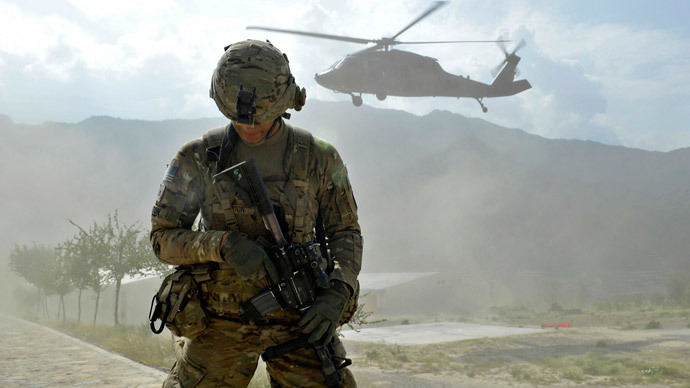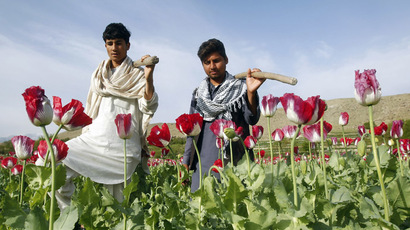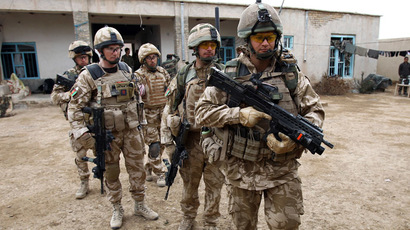Britain’s 13yr stay in Afghanistan ends as US, UK hand over military bases

The US’ and Britain’s military involvement in Afghanistan came to a symbolic end on Sunday. Operations in the country were officially ended, as they prepare to depart and handed over military bases to Afghan forces.
The Afghan army and police will now largely be left to deal with having to fight the Taliban, after the allies ended their 13-year campaign.
The US and the UK handed over their last bases to the Afghan forces, including Camp Leatherneck, which was the largest American base in Afghanistan. The British presented them with Camp Bastion, which was their headquarters during the conflict. Both military centers were located in the Helmand Province, which has seen some of the fiercest fighting during allied forces’ engagement.
The UK’s Secretary of State for Defence Michael Fallon said, “It is with pride that we announce the end of UK combat operations in Helmand, having given Afghanistan the best possible chance of a stable future. Our Armed Forces’ tremendous sacrifice laid the foundations for a strong Afghan Security Force, set the security context that enabled the first democratic transition of power in the country’s history, and stopped it being a launch pad for terrorist attacks in the UK,” he was quoted on the Ministry of Defence’s (MOD) website.

The MOD confirmed that 140,000 international servicemen took part in the Afghan operation.
"It's empty now - when I got here, it was still bustling, so there were a lot of services around and people around," said Marine Capt. Ryan Steenberge, who was helping to oversee the transfer of the last troops. "It's weird to see different pieces pull away," he added, speaking to Reuters.
READ MORE: Longest in US history: Afghan War turns 13, US military deaths grow 4-fold under Obama
According to research published in 2013 by Harvard University says the financial toll of the Afghan war and the Iraq war on Uncle Sam's wallet could be in the region of $4 trillion to $6 trillion.
The Afghan conflict has inflicted a heavy death toll on US and allied troops. The iCasulties website says that the US military suffered 2,349 deaths during its campaign, including 48 this year. However, there has been a sharp spike since President Barack Obama came into office in 2009, with Breitbart News reporting that 1,649 deaths or around 75 percent have occurred since the US president’s first term.

The number of allied troops to stay in Afghanistan has been whittled down to 12,500, who will mainly stay in an advisory role to the Afghan security forces. Just under 10,000 will be US servicemen. Since June 2013, they have been responsible for 99 percent of security operations in the country, according to the MOD.
The Afghan forces are likely to face a testing time in recent years against a resurgent Taliban. Helmand Province produces around 80 to 90 percent of Afghanistan’s opium, which is a crucial source of funds for the Taliban to finance their military operations. Therefore, this is a crucial area for them to gain control of and has seen heavy fighting.

Despite Washington spending $7.6 billion on counter-narcotics programs in Afghanistan, opium production is at an all-time high. In 2013, The Central Asian country cultivated a record 209,000 hectares of opium poppy in 2013, beating the previous highest level of 193,000 hectares in 2007, according to the UN Office on Drugs and Crime (UNODC).
READ MORE: America’s $7.6 billion war on Afghan drugs fails, opium production peaks
While Afghanistan seems to be losing the battle against opium production, outgoing US forces have a little more optimism that the country’s army will cope better.
"I'm cautiously optimistic they will be able to sustain themselves," said Brigadier General Daniel Yoo, the commander of Regional Command (Southwest), said of the Afghan forces, which was reported by Reuters.
He said the success of the Afghan security army and police depended on leadership, continued development of logistics and confidence; however, there are concerns about whether they will be able to cope without allied intelligence and air support.
"They've got to want it more than we do," he also mentioned in regards to the Afghan forces, who have suffered heavy losses in recent months.














